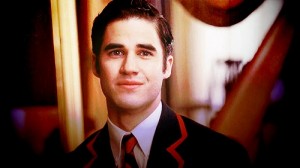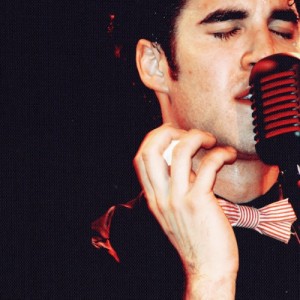Glee: The Countertenor and The Crooner, Part 3

Darren Criss, America's Boyfriend
This is the last of a 3-part series of articles on these male voices in Glee.
“Your eyes are like stars right now…Mind if I move in closer?” sings dreamy crooner Blaine Anderson (Darren Criss) to our countertenor hero, Kurt Hummel (Chris Colfer), as they perform the classic Hollywood duet, “Baby, it’s Cold Outside.” This is only one of the many charming and provocative romantic overtures Blaine makes, in song, to Kurt as well as to other young men during the course of Glee’s second season, and it is only one of the many performances by Blaine, both with Kurt and with his a cappella group The Warblers, that queers the performance of a traditionally gendered song.
With Blaine’s character, Glee both honors and re-imagines the crooner for the new millineum. As I discussed in Part 1, the crooner has long been a liminal figure in American culture, operating both in the commercial mainstream and on the fringes of gender normativity, and has been culturally stigmatized for both reasons. But Dalton Academy is Glee’s version of Oz, where normative American gender expectations and roles have been suspended and gender hierarchies largely reversed. The allure of the prep/college boy culture has always been, in part, about prolonging male adolescence by delaying the assumption of normative male roles. Indeed, the first crooning idols originally emerged from college culture in the 1920s, and it is a world in which the crooner thrives.
Glee celebrates the crooner for the very qualities that masculinist America does not: his alignment with the cultural feminine through his preference for romantic songs and commercial pop, his status as an erotic object for male and female audiences, his beauty and sensitivity, his emotional openness and transparency. And Glee’s producers have cast an actor as Blaine, Darren Criss, whose star persona emphasizes and extends these same qualities to a remarkable degree. Like Kurt/Colfer, Blaine/Criss offers a new model of American male performer, one that goes beyond being gay-and-girl “friendly” to truly embracing a gender-queer performance style and persona. Blaine/Criss retains the sincerity of the crooner even as he performs beyond the boundaries of a fixed or normative gender identity.
As an all-male a cappella group, the Warblers sing de facto love songs to each other, a violation of gender norms that has generally made such groups accessible only to the cultural elite (they are dubbed by Tuft University’s Beelzebubs). But Glee takes its transgressions much further. Because Blaine is the lead singer, an out gay character, and seen primarily through Kurt’s desiring eyes, all of his performances have a homoerotic charge. Moreover, Blaine specializes in songs by female singers without changing the lyrics, thus often positioning himself in the feminine role, whether that be as the erotic object (the one who will “let you put your hands on me in my skin tight jeans”) of Katy Perry’s “Teenage Dream,” or the annoyed girlfriend of Destiny’s Child’s “Bills, Bills, Bills.” When Blaine does play the seducer (he’s versatile), he serenades other boys as girls, for instance, when he continually addresses a male Gap store attendant as “baby girl” while wooing him with the Robin Thicke song “When I Get You Alone.”
It is Blaine’s musical performances with Kurt, however, that give emotional and narrative weight to the Warblers’ gender-play. When Kurt transfers back to McKinley, Blaine and the Warblers come to sing “Somewhere Only We Know” to him, evoking the “Somewhere Over The Rainbow” period of Kurt’s stay at Dalton, but assuring audiences that, unlike Dorothy, Kurt will retain both the maturity Dalton gave him and a dreamy prince:
This particular performance sparked euphoria among fans as soon as the single and the scene were released on Youtube, which happened a few days prior to the episode’s premiere. The verbal and physical reactions to crooning haven’t changed that much in 80 years; fans repeatedly cry when listening to the song, compliment Darren Criss on the beauty of his voice, claim to be falling in love as well as erotically aroused by him (“Can this song make me pregnant?”), and indicate “repeated abuse” of the replay button to prolong their ecstatic state. What is less common here is the context for such intense emotion: the fact that Blaine is singing this song to Kurt makes the song more rather than less meaningful for fans, who largely identify with Kurt and love Blaine as the boyfriend Kurt “deserves.” Cross-gender identification is common practice for television fans, who often create “slashed” homoerotic fiction surrounding a relationship that is not homoerotic in the text. In this case, however, the intensity of fan euphoria is tied to the text slashing itself, further naturalizing gay relationships by revising the rules of the musical genre. As the warm, pure-hearted crooner, Blaine becomes the perfect counterpart and love object for the more ambitious, complex Kurt and for fans.

Part of the reason Blaine is so beloved is because of the young man who plays him. Darren Criss himself occupies queer cultural space in that he identifies as straight but plays gay, champions the mass culture associated most with women and children (like Disney songs), and is more than happy to be an erotic object for both sexes (see, for example, his spread in Out magazine). Perhaps most unusual of all, Criss writes and performs songs from a female point of view even outside of the Blaine character. Criss composed the song “The Coolest Girl,” for the character of Hermione in a musical adaptation of Harry Potter. In concert, he often performs the song, asking the largely female audience to join in, since “I am not a girl, although I try to be sometimes”:
Just as Colfer provides a model for queer kids who have not yet been represented, so Criss provides an equally significant alternative model for queer straightness. Both performers, through Glee and beyond it, give voice to radically fluid adolescent masculinities that do indeed offer their audiences new ways to dream.



Thanks for a really wonderful series, Allison! Your analysis is interesting and provocative–lots of food for thought, here. Thanks for sharing!
Thought of you and these posts watching last night’s episode, when Kurt explains to Jesse that the glee club got over him singing “girl songs” a long time ago. 🙂
Yes, hopefully the rest of America will follow! I really appreciate how open they are about what they’re doing.
Thanks for these fantastic columns, Allison. Helped me understand the pleasures of (certain parts of) Glee for me and others. This series has been the best things I’ve seen on Antenna thus far!
I would dispute one aspect of your analysis. In the fan fiction, sexual roles are more or less evenly distributed between Kurt and Blaine, and the latter is not the systematic bottom you describe.
As for the rest, stimulating ideas.
I see you have modified your text to take my comments into account. I am impressed; not all essayists are as open to outside views.
Hi Rackham-
Indeed, I’m glad to have your input on this. It is certainly possible that the fanfic sites I was looking at were not representative; I will have to look at more sites. I also find it very plausible that the fanfic relationship is more egalitarian, since both characters transgress normative gender roles (in different ways). Thanks again for your response!
[…] via Glee: The Countertenor and The Crooner, Part 3 | Antenna. […]
Your series of articles have made Glee, for me, an even more delightfully subversive show than I thought possible. Thank you!
These articles are wonderful. I think I had been struggling with how and why I loved the Blaine/Kurt storyline so much. Being raised in an environment that wasn’t particularly accepting, it was hard to love something that wasn’t exactly the “norm.” Just like you were saying, I find myself swooning over Darren Criss and identifying with Chris Colfer, especially when they’re singing to each other, and it’s reassuring to know I have a good reason to feel like that.
This has been an amazing and insightful series uncovering the cultural power in Kurt and Blaine’s voices, and arguably, the most compelling character narratives on Glee (clearly the relationship the writers have the most interest in).
However, I would ask about our initial introduction to Blaine. Although Kurt had feelings for him from the beginning, Blaine was incredibly selfish, and the show seemed to be setting up a relationship where Kurt would have to play down his desire for stardom in order to have any relationship with Blaine. I wonder whether or not this change in Blaine is a symptom of the continual amnesia the writers have for their characters over time or perhaps part of the larger machine that packages the characters and songs for easier consumption. Does Blaine’s likability transcend into prolonged music/concert sales that have become the hallmark of the show? Moreover, how does this character change play into the show’s own smoothing over of its initial satiric black comedy beginnings?